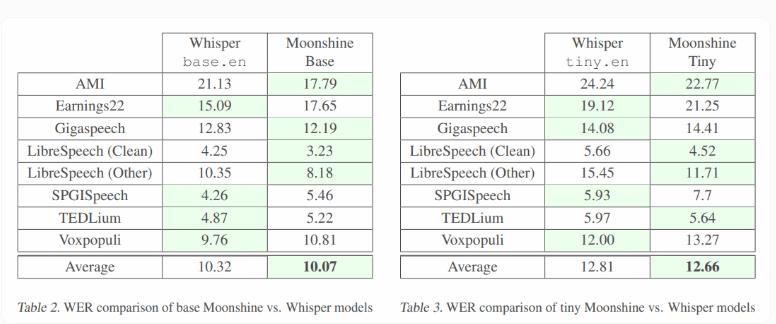US startup Useful Sensors has released an open source voice recognition model called Moonshine, aiming to improve the efficiency of audio data processing. Compared with OpenAI's Whisper, Moonshine is more economical in computing resources and has increased processing speed by five times, especially for resource-constrained hardware and real-time applications. Its flexible architecture and dynamic adjustment of processing time according to audio length make it outstanding when processing short audio clips and effectively reduce processing overhead. Moonshine provides two versions, Tiny and Base, with parameters of 27.1 million and 61.5 million, respectively, both of which are better than the performance of similar models in resource utilization.

Unlike Whisper that divides audio into fixed 30-second clips, Moonshine adjusts the processing time according to the actual audio length. This makes it perform well when handling shorter audio clips, reducing the processing overhead due to zero padding.
Moonshine has two versions: the small Tiny version has a parameter volume of 27.1 million, and the large Base version has a parameter volume of 61.5 million. In contrast, OpenAI's similar model parameters are larger, with Whisper tiny.en being 37.8 million and base.en being 72.6 million.

Test results show that Moonshine's Tiny model is comparable to Whisper in terms of accuracy and consumes less computing resources. Both versions of Moonshine are lower than Whisper in word error rate (WER) for various audio levels and background noise, showing strong performance.
The research team pointed out that Moonshine still has room for improvement when processing extremely short audio chips (less than one second). These short audios account for a small proportion of training data, and increasing training of such audio clips may improve the performance of the model.
In addition, Moonshine's offline capabilities open up new application scenarios, and applications that were previously unavailable due to hardware limitations are now feasible. Unlike Whisper, which requires higher power consumption, Moonshine is suitable for running on smartphones and small devices such as Raspberry Pi. Useful Sensors is using Moonshine to develop its English-Spanish translator Torre.
Moonshine's code has been released on GitHub, and users need to note that AI transcription systems like Whisper may experience errors. Some studies have shown that Whisper has a 1.4% chance of false information when generating content, especially for people with language barriers, with higher error rates.
Project entrance: https://github.com/usefulsensors/moonshine
Key points:
Moonshine is an open source voice recognition model that processes five times faster than OpenAI's Whisper.
This model can adjust processing time according to the audio length, especially suitable for short audio clips.
Moonshine supports offline operation and is suitable for use with limited resources.
In short, Moonshine brings new possibilities to voice recognition technology with its efficient processing speed, flexible architecture and low demand for resources, especially in resource-constrained devices and real-time application scenarios. Its open source features also facilitate developers to improve and apply, and are worth paying attention to and looking forward to.